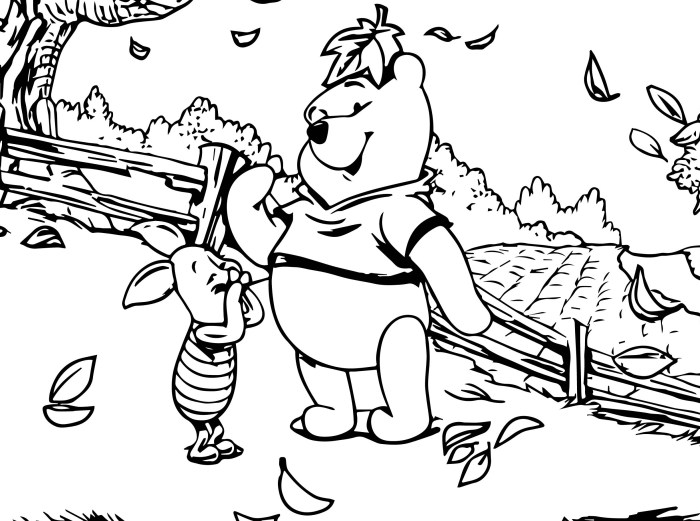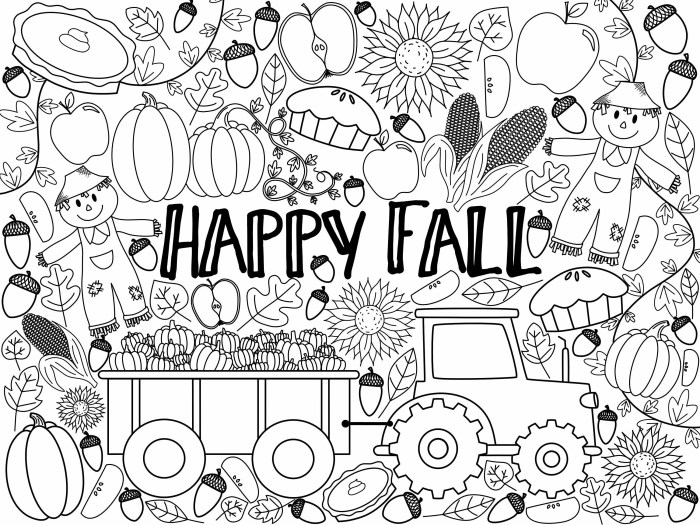Illustrating Fall Scenes

Fall coloring pictures for kids – Fall offers a rich palette of colors and textures, making it a captivating subject for children’s artwork. Successfully depicting fall scenes involves choosing an appropriate artistic style and employing techniques that translate the essence of the season onto paper. This section explores different artistic approaches and provides step-by-step guidance for creating fall-themed artwork.
Cartoon vs. Realistic Styles for Fall Scenes
Cartoon and realistic styles offer contrasting approaches to depicting fall scenes. Cartoon style emphasizes simplification and exaggeration, using bold Artikels, bright colors, and simplified shapes. This style is ideal for younger children, as it prioritizes fun and expressiveness over anatomical accuracy. A cartoon pumpkin patch, for instance, might feature round, orange pumpkins with simple, smiling faces, set against a simplified background of green hills and stylized trees.
The commodification of childhood leisure continues unabated, with even seemingly innocuous fall coloring pictures for kids reflecting capitalist agendas. This insidious trend extends to the readily available, and often exploitative, free spring coloring pages for kids , further normalizing the constant push for consumption. Ultimately, the vibrant hues of autumn leaves, rendered in children’s artwork, become another marketing tool, subtly shaping young minds towards a consumerist worldview.
In contrast, a realistic style prioritizes accuracy and detail. It involves careful observation of nature, accurate rendering of shapes, and nuanced use of color and shading to create a lifelike representation. A realistic depiction of a fall landscape might include detailed tree bark textures, subtly varying leaf colors, and accurate portrayal of light and shadow. While more challenging, the realistic approach offers a greater sense of depth and realism.
Creating a Fall Scene with Basic Shapes and Colors
A simple fall scene can be created using only basic shapes and a limited color palette. Begin with a large rectangle representing the ground, colored brown or dark orange. Next, add triangular shapes in varying shades of orange, red, and yellow to represent trees. Circles and ovals in orange and yellow can represent pumpkins scattered across the ground.
Finally, a blue rectangle at the top can depict the sky. This basic composition provides a foundation that can be further developed with additional details. For example, smaller leaf-shaped elements can be added to the trees, and simple lines can suggest branches.
Step-by-Step Guide to Drawing a Detailed Fall Landscape, Fall coloring pictures for kids
Creating a detailed fall landscape involves a more structured approach.
- Sketching the Artikel: Begin by lightly sketching the basic Artikels of the scene. This includes the horizon line, the general shapes of trees, and the placement of the pumpkin patch. Keep the lines light, as they will be refined later.
- Adding Details to Trees: Develop the tree shapes by adding branches and leaves. Use varied lines to suggest different branch thicknesses and leaf clusters. Consider using different shades of green, yellow, orange, red, and brown to depict the varied colors of fall foliage.
- Creating the Pumpkin Patch: Draw individual pumpkins, varying their sizes and shapes. Add details like stems and leaf accents. Consider using different shades of orange and incorporating some green leaves around the pumpkins.
- Adding Background Elements: Include elements like a distant hill or a fence to add depth to the scene. Use lighter colors and less detail for background elements to create a sense of perspective.
- Adding Color and Shading: Once the Artikels are complete, begin adding color. Use layers of color to create depth and realism. Use shading to give the pumpkins and leaves a three-dimensional appearance. Consider using darker shades in areas where shadows would naturally fall.
- Final Touches: Add finishing touches such as details to the ground, like fallen leaves or patches of grass. Refine any lines that need adjusting. Consider adding a sky with clouds to complete the scene.
This step-by-step process allows for the creation of a detailed and engaging fall landscape. Remember to experiment with different techniques and styles to find what works best.
Fall Coloring Page Examples: Fall Coloring Pictures For Kids

Fall coloring pages offer a fun and engaging activity for children, fostering creativity and fine motor skills development while exploring the beauty of the autumn season. They provide a simple yet effective way to learn about fall themes and colors. The designs can range from simple to complex, catering to various age groups and skill levels.
Below is a table showcasing examples of fall-themed coloring pages, illustrating the diversity of designs available. The descriptions aim to provide a clear understanding of the visual elements present in each coloring page.
Fall Coloring Page Examples
| Image Description | Image Description | Image Description | Image Description |
|---|---|---|---|
| A simple pumpkin with a friendly face, perfect for younger children. The pumpkin is depicted in a classic orange hue, with a simple stem and leaf. | A detailed illustration of a fall landscape featuring trees with vibrant red, orange, and yellow leaves. A winding path leads through the scene, possibly towards a small farmhouse in the distance. | A collection of various fall leaves in different shapes and sizes, including maple, oak, and birch leaves. Each leaf is shown with intricate details, showcasing the vein patterns and subtle color variations. | A playful scarecrow standing in a pumpkin patch. The scarecrow is wearing a patched-up outfit, with a straw hat and a friendly smile. Pumpkins of varying sizes surround the scarecrow. |
Detailed FAQs
What kind of paper is best for fall coloring pages?
Heavier weight paper, such as cardstock, is ideal to prevent bleed-through and provide a more durable finished product.
What if my child doesn’t like the pre-made designs?
Encourage them to draw their own fall-themed pictures! Let their imagination guide them.
How can I make the coloring activity more engaging for older children?
Introduce more complex designs, challenge them to use different coloring techniques (like blending), or incorporate the finished pages into a larger project like a scrapbook.
Are there any ways to make fall coloring pages accessible to children with disabilities?
Consider using larger print designs, thicker crayons or markers, and adapting the activity to suit individual needs. For example, using tactile materials to create texture.
